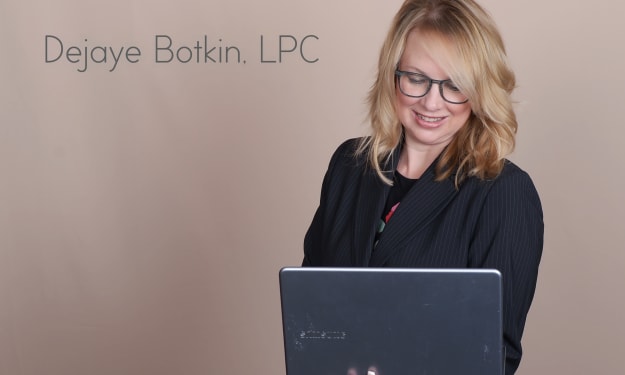The Search for Happiness
Happiness is not a destination, it is a moment in time

The Search for Happiness
By Dejaye Botkin, LPC
During my initial assessment with a client, I always ask, “What are your three goals for therapy?” The most common answer I hear is, “I want to be happy.” My young clients in particular often state that happiness is their single most important therapy goal and frequently express desperation for this goal to be achieved. I often hear clients express their desire to achieve happiness in this sequence: “I am either happy or sad. I know I am not happy, so I must be sad. Since I feel sad almost every day, I must be depressed, which makes me want to end the pain.”
Adolescents are prone to thinking in extremes like the above example, which is otherwise known as “black-and-white thinking” or “all-or-nothing thinking” in Dialectical Behavior Therapy. Black-and-white thinkers can talk themselves right off a bridge with one thought, such as “I feel hopeless and it will never get better, so I am going to end my life.” Conversely, extreme all-or-nothing thinkers can also convince themselves to stay strong by thinking “My life feels hopeless right now, but I am going to focus on making things better. Instead of thinking in black and white, I am going to try to find the gray area.”
When I hear my clients describe happiness as their ultimate goal, I encourage them to break down the meaning of what happiness means to them personally. “What does happiness mean to you?” I ask. This is a very tricky question with a wide variety of answers. As we know, culture, religion, and environmental influences inform our definition of happiness.
Happiness is a subjective concept. Some will say financial fortune will lead to happiness, others may say that having a roof over their head will lead to happiness and some seek a deeper - more existential meaning of happiness, such as serenity and inner peace. I try to explain to my clients that happiness is on a spectrum.
On one end you may have happiness and on the opposite end - sadness, but in between the two extremes there is contentment, neutrality, joy, fear, pain, balance, etc. All of our emotions appear on a spectrum somewhere in between happiness and sadness.
This book is written with young people in mind; however, readers of any age will benefit from the lesson. The protagonist in this story is called ‘The person.’ The main character is intentionally meant to be gender- and age-neutral so that anyone who reads this book will relate to the main character.
I encourage parents, counselors, and teachers to read this book with your children and then have a personal discussion afterward. I encourage all readers to reflect on your definition of happiness, keeping in mind that emotion occurs from thought and circumstance. Happiness is not a permanent state of being, it is a moment in time. Even if a person has all of the elements in place that one would expect would result in happiness, people are constantly evolving and emoting, times are changing - and as a result, thoughts and feelings ebb and flow accordingly.
I hope you enjoy the book and I look forward to your feedback!
Dejaye Botkin, MA, LPC, NCC, CTP, DBTC, CCTMP
Acknowledgment
Thank you to my clients’ who inspired me to write this book!
This is a story about a person determined to find happiness…
The person in this story is constantly overhearing people talking about happiness. Everywhere the person goes, home, school, out with friends, everyone seems to be talking about happiness, yet the person still does not know what happiness truly means or where on earth to find it...
The Search
Resolved to find happiness, the person decided to go searching for this mysterious thing everyone was talking about. From what the person could tell, everyone who had found happiness felt wonderful, so, of course, the person wanted happiness, too.
The person started looking everywhere–in the house, in the back yard, in the classroom, on the playground, but to no avail. This person could not find happiness.
Eventually, the person grew frustrated and asked a senior citizen where to find happiness. The older person asked, “Don’t you feel it now?”
The person replied, “I don’t know if I feel it because I don’t know what happiness feels like.”
The older person asked, “Have you ever cried?”
The person responded, “Yes, I feel sad most of the time. That is why I want to find happiness. I don’t want to feel sad anymore!”
The older person said, “Well, happiness is the opposite of sadness. That’s all there is to it!” With that, the older person walked away.
The conversation with the older person only made the younger person feel worse. The person thought, “If happiness is the opposite of sadness, then I may never find happiness because I am always feeling sad.” With that, the person fell asleep, feeling exhausted.
The next day, after another draining search, the person was starting to give up hope of ever finding happiness. The person was not sure about the feeling of happiness but certainly felt exhaustion from this endless journey, then fell asleep.
The next morning, the person woke up feeling recharged and motivated to continue searching for happiness.
The person started asking all around the town, “What is happiness?” The person asked the neighbors, delivery people, teachers, older people, younger people, people in coffee shops, people in the shopping malls…“Does anyone know what happiness feels like?”
The person heard so many different stories from so many different people. One young girl said, “Happiness is when I celebrate my birthday and eat lots of sweets!” A grouchy old man said, “Happiness is when I get to read the newspaper alone!” A college student said, “Happiness is when I am done with finals!” One mom yelled out, “Happiness is when everyone in our family washes their dishes!”
Then, the person saw a young boy sitting on the sidewalk all alone, looking pretty tired and cold. The boy said in a whisper all hunched over, “Happiness is when I have a safe place to sleep at night.”
This search left the person feeling more confused than ever because everyone had a different answer to the person’s question. “How can happiness mean something so different to so many people?” the person wondered.
The person had been taught repeatedly to never give up, to be resilient, and to persevere. Therefore, despite the person feeling frustrated and even slightly hopeless, the person kept going, continuing to look everywhere and ask everyone. The person even said a prayer before bed, pleading, “Dear Guardian Angel, please help me find happiness.”
The next morning the person awoke with the bright idea to look at family photos because everyone was always smiling in pictures. After looking at a family photo album, the person thought, “I recognize these people. We all look happy in these pictures, so we must have been happy during these times, right?”
But the experience of looking through family photos left the person feeling confused because more often than not when the people in these photos were not taking pictures, they were not in a happy place at all.
Again, that night the person prayed, “Dear Guardian Angel…please help me find happiness!
That night the person had a vivid dream. In the dream, the Guardian Angel visited the person and said, “I understand that happiness is what you seek. Dear sweet person, happiness is not an object or a destination. It is a state of mind, a moment in time.”
Confused, the person asked, “Will you help me understand what you mean?”
The Guardian Angel said, “Happiness is not a place. It is not an all-or-nothing feeling or a certain way of permanently being. Happiness is a state of mind - at a moment in time. Sometimes a person may feel happiness, but very quickly a person’s feeling may change to contentment or, perhaps, to a feeling of pride or joy! Then an event happens where the same person learns of a tragedy and that person transitions into feeling devastated. The point being, emotions change quickly based on how you perceive an event.”
The Guardian Angel went onto say, “Feelings and emotions are always transitioning into other feelings. For example, unresolved resentment may turn into anger, fear may turn into anxiety, and joy may turn into excitement. All of these feelings are somewhere on a spectrum between happy and sad. When you change your circumstances, you can bring about happiness if you focus on joyful moments. Happiness is within you! You just have to think it into existence. For example, you may find happiness by looking around and finding little things that make you grateful; like a friend, a book, or a teacher. In any circumstance, you can realize happiness if you focus on what you are thankful for instead of wishing things were different.”
“So, happiness is a feeling or a thought?” the person asked.
The Guardian Angel said, “Yes, both. It is a temporary feeling based on a thought that you are having at that particular moment in time. If you are eating your favorite flavor of ice cream while sitting in the sunshine and thinking, ‘Life is good right now,’ you are probably feeling happy. Just like how everyone can have a different favorite flavor of ice cream, different things make different people feel happy. On the other hand, if you are running away from a bully trying to steal your ice cream - you may quickly transition from feeling happy to feeling scared!”
Finally, the person had the answer! The person was so excited the next morning about this discovery that the person wanted to share it with everyone around. The person made posters and hung them around the neighborhood.
The posters read:
“Happiness is a state of mind!”
“Happiness is a moment in time!”
“Happiness is determined by your thoughts!”
“Happiness is not a destination!”
“Happiness is meant to be brief so we can appreciate it more when we feel it!”
“Happiness is different for everybody!”
Then, the person started celebrating with friends and family!
The person explained to everyone listening, “Happiness is not the opposite of sadness. Happiness is not all or nothing – one or the other! Happiness can be anywhere, in between two extremes – joyful, peaceful, excited, hopeful, proud...There are so many different emotions we may feel that are similar to happiness!”
Feeling very smart and proud, the person invited everyone to share a personal story about happiness.
Everyone began to gather around in a circle that grew larger and larger. They raised their hands and waited for their turns to speak. After a few people shared their stories, a woman exclaimed, “I finally understand! Different things make different people happy! It’s ok if what makes me happy is not the same as what makes my friend happy! We can find happiness when we stop trying to follow everyone else’s version of happiness and follow our own! Happiness is like a box of crayons – it comes in many different colors and shapes!”
Then a man said, “I knew I felt joy and excitement at times, but I had no idea that is was what happiness feels like, too! I have learned over time that the feeling doesn’t last forever, but it’s a pretty great sensation while it lasts!”
Another woman said, “I feel so relieved because I thought I was someone who could not find happiness and now I am thinking it is because I was not practicing gratitude!” Another man said, “Me, too!” Everyone in the crowd started clapping and nodding.
Finally, the child who looked very tired and cold on the sidewalk said, “So when I find a warm place to sleep at night that means I am happy?” The person replied, “Yes - if you are grateful for that warm place and you get a good night’s sleep, I’m sure you feel very happy!” The child replied, “Yes, I do feel happy when I am safe and warm. It helps me to know that I can think happiness into existence by being grateful for what I have when I have it.”
As the crowd continued to grow, the level of excitement grew, too. Everyone was explaining their own stories about feeling joy and excitement.
Finally, the person heaved a big sigh of relief. At that moment the person felt a sense of accomplishment and pride, not only because the person had figured out what happiness meant, but because the person had helped everyone else figure it out, too.
Suddenly, the person leaped back and shouted, “Yes! This is it, at this moment right now, I found happiness!” And, knowing that it eventually would end, the person smiled and simply enjoyed feeling happy.
The End
About the Creator
Dejaye Botkin
I am a psychotherapist specializing in interpersonal relationship challenges. After the Covid-19 outbreak, I pivoted from my Scottsdale private-practice to working as a telehealth professional. I am licensed in NJ and AZ. dejayebotkin.org






Comments
There are no comments for this story
Be the first to respond and start the conversation.